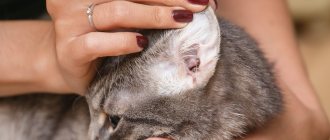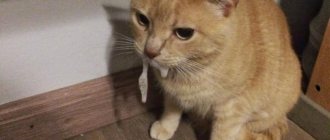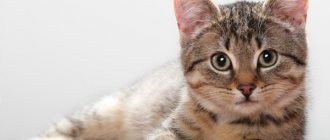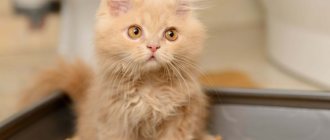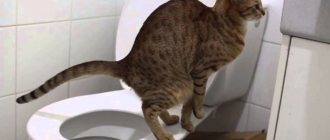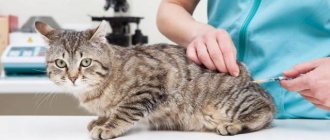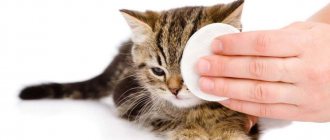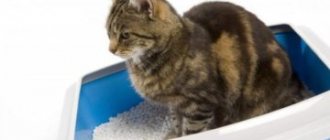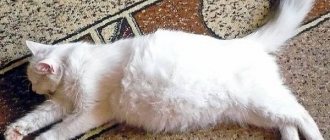Cats suffer from stomach pain just as much as humans. The causes of discomfort in an animal can be very different: there are many organs in this area, malfunctions of which can cause pain. Pets may be bothered by pain in the stomach, liver, gall bladder, and kidneys.
Cats do not know how to complain, but an attentive owner can understand what is happening to the pet if he observes its behavior. This will allow him to promptly identify the problem and cure the animal.
Causes of abdominal pain
The main causes of the problem are:
- Helminthiasis. Infection with worms and protozoa leads to dysfunction of the gastrointestinal tract.
- Food allergies. Accompanied by skin rash, flatulence, indigestion.
- Constipation.
- Damage to the stomach wall with a sharp object.
- Poisoning with food or a toxic substance.
- Peptic ulcer of the stomach and intestines.
- Panleukopenia (feline distemper). A viral disease that affects the digestive tract and respiratory organs.
- Ascites. A pathology in which a large volume of fluid accumulates in the abdominal cavity.
- Cholelithiasis.
- Intestinal cramps and accumulation of gases. May be a consequence of poor nutrition.
- Inflammatory diseases of the digestive system (enteritis, pancreatitis, gastritis, colitis, peritonitis).
- Gynecological diseases. Sharp pain in a cat may occur due to ovarian rupture, and aching pain may occur due to endometritis or pyometra. These diseases can develop as a result of hypothermia, birth injuries, or taking hormonal medications.
- Pathologies of the urinary organs. Pain in the lower abdomen of a cat can occur from blocking the ureter or urethra with a stone.
- Neoplasms in the abdominal cavity.
Pain in the stomach can be caused by an unbalanced diet, abuse of fatty foods, and overeating. In this case, the cat has a stomach ache after eating. In kittens, the likelihood of this problem increases when switching from breastfeeding to another diet.
Serious diseases of internal organs
So, the kitten has a big belly. Why does this happen? If your pet is eating properly, but its tummy is still swollen, this may indicate serious illness. It is impossible to determine such a disease by eye. Therefore, pet owners must take their kitten to the veterinarian.
Thus, the cause of bloating can be serious problems with the liver, malignant tumors, improper functioning of the pancreas, as well as abnormalities in the functioning of the immune system. In addition, bloating can be a consequence of an obese kitten. But in this case, not only the pet’s stomach will show discomfort. The kitten itself will become fat and gain significant weight.
Of course, this is not the entire list of possible causes of bloating in a kitten. Only an experienced veterinarian with special equipment can see the full picture.
So, if the animal has become lethargic and drowsy, you should pay attention to this and immediately consult a doctor
Why does the kitten have a big belly, but he himself is thin? One of the most dangerous problems that causes bloating is ascites. In this case, the kitten suffers from the accumulation of fluid in the abdominal cavity. Peritonitis is very dangerous and requires immediate medical intervention.
What to do if your kitten has a bloated belly? What to do? It is necessary to determine whether the pet actually has ascites. To do this, it is recommended to pick him up and hold him in an upright position for a while. If the animal’s figure resembles a pear (which occurs as a result of liquid flowing down), and after lowering the kitten’s belly again looks like a ball, then there can be no doubt. Therefore, do not hesitate, go to the doctor.
Now you know why a kitten experiences bloating and gas. The reasons may be different. The main thing is to correctly identify the disease. Some problems can be dealt with on your own, while others will require medical intervention.
In any case, people who want to have a cute pet should understand that this is a huge responsibility. Therefore, before adopting a kitten, you should learn more about proper nutrition and caring for babies, and only then get a pet. The right approach can help new owners protect the animal from most of the diseases listed above.
Source
Diseases that cause bloating
A swollen, hard tummy occurs in pets due to various diseases. Diagnosis should be carried out by a doctor, but it doesn’t hurt to know the characteristic symptoms.
Liver failure
Why does a kitten's whiskers break: the main reasons and what to do
If a one-month-old kitten has a hard and bloated tummy, you should think about liver problems. It could be hepatitis or cirrhosis. The disease can be identified by yellowing of the whites of the eyes, a regular increase in body temperature and loss of appetite. With cirrhosis of the liver, an animal experiences diarrhea, vomiting, flatulence and loss of appetite. In such cases, the abdominal cavity swells and hurts.
Oncological diseases
If the cat has a large belly, but he is thin, you should think about cancer. Such pathologies are usually found in adult cats, but every year the oncology becomes younger and appears even in newborn cats. In the initial stages of development, cancer may be asymptomatic. It does not cause significant symptoms. The only warning sign is your pet's protruding belly. Over time, weakness, loss of appetite and weight appear. Given the baby's low body weight, the belly is too large.
Additional symptoms include: pain, digestive problems, enlarged lymph nodes that can be felt in the form of balls under the skin.
Important! In the final stages of cancer, the pet loses a lot of weight and spends almost 95% of all time in passive mode.
Infectious peritonitis
If the kitten has a large and hard tummy, this may be a sign of developing peritonitis. This is one of the most dangerous diseases of the gastrointestinal tract, which is accompanied by an inflammatory process of the abdominal organs. In addition to an enlarged belly, the pet develops regular diarrhea, profuse vomiting, fever, and increased body temperature.
Pancreatitis
If a kitten has a swollen belly, this may indicate the development of pancreatitis. The pathology is accompanied by severe pain radiating to the side, spasms and bloating. The cat loses its appetite, sleeps poorly and becomes thin.
A large belly in a cat that regularly lives outdoors may indicate pregnancy. In such cases, the physical health of the animal remains virtually unchanged. Good appetite and drowsiness are noted.
Serious diseases of internal organs
So, the kitten has a big belly. Why does this happen? If your pet is eating properly, but its tummy is still swollen, this may indicate serious illness. It is impossible to determine such a disease by eye. Therefore, pet owners must take their kitten to the veterinarian.
Thus, the cause of bloating can be serious problems with the liver, malignant tumors, improper functioning of the pancreas, as well as abnormalities in the functioning of the immune system. In addition, bloating can be a consequence of an obese kitten. But in this case, not only the pet’s stomach will show discomfort. The kitten itself will become fat and gain significant weight.
Of course, this is not the entire list of possible causes of bloating in a kitten. Only an experienced veterinarian with special equipment can see the full picture.
So, if the animal has become lethargic and drowsy, you should pay attention to this and immediately consult a doctor
Why does the kitten have a big belly, but he himself is thin? One of the most dangerous problems that causes bloating is ascites. In this case, the kitten suffers from the accumulation of fluid in the abdominal cavity. Peritonitis is very dangerous and requires immediate medical intervention.
What to do if your kitten has a bloated belly? What to do? It is necessary to determine whether the pet actually has ascites. To do this, it is recommended to pick him up and hold him in an upright position for a while. If the animal’s figure resembles a pear (which occurs as a result of liquid flowing down), and after lowering the kitten’s belly again looks like a ball, then there can be no doubt. Therefore, do not hesitate, go to the doctor.
Now you know why a kitten experiences bloating and gas. The reasons may be different. The main thing is to correctly identify the disease. Some problems can be dealt with on your own, while others will require medical intervention.
In any case, people who want to have a cute pet should understand that this is a huge responsibility. Therefore, before adopting a kitten, you should learn more about proper nutrition and caring for babies, and only then get a pet. The right approach can help new owners protect the animal from most of the diseases listed above.
Source
Symptoms
You can suspect that your pet has a stomach ache based on the following symptoms:
- The cat often meows for no reason.
- The animal takes unnatural poses and behaves restlessly.
- Touching a cat's stomach causes twitching, crying, and sometimes an attack of aggression.
- The abdominal muscles are tense.
- The cat loses appetite and sometimes thirst.
- The pain may be accompanied by bloating, vomiting and diarrhea.
If your cat is very thirsty, has sores in the corners of his mouth, has a stomach ache and is bothered by bloody diarrhea, most likely he has developed viral enteritis.
If a cat has a stomach ache and constipation, this may indicate intestinal obstruction, campylobacteriosis, giardiasis, inflammatory diseases of the digestive system, helminthic infestation, and gallbladder disease. If a cat has cholelithiasis, an enlarged organ may be palpable in the right hypochondrium, and manifestations of jaundice are also likely.
With diseases of the genitourinary system, a cat may experience discharge with blood and pus, and it will often lick the perineum. In acute cases, the temperature rises, appetite disappears, and the external genitalia swell.
If a cat has urolithiasis, deurination will be rare, mixed with blood. A rupture of the ureter or bladder will be accompanied by severe pain, restlessness and severe crying. With peritonitis, blood or organ contents leak into the abdominal cavity. The cat will be tormented by thirst, sharp pain, fever, vomiting, and the mucous membranes will become light in color.
Chronic diseases of the gastrointestinal tract are manifested by alternating constipation and diarrhea, and periodic abdominal pain. With giardiasis, stool becomes liquid and foamy. An infectious disease and exacerbation of the inflammatory process can be judged if the cat has a stomach ache and diarrhea. .
Associated symptoms will almost always include fever, loss of energy, and vomiting.
These same signs may indicate poisoning. If the cause is a toxic substance, the cat may begin to have convulsions and foam at the mouth. If a cat has ascites (fullness of the abdominal cavity with fluid), the abdomen will be greatly enlarged in size, and shortness of breath is also often observed.
If the kitten has a stomach ache, vomiting and panos
Proper care and prevention is an important aspect for a kitten to live a full life without diarrhea and other troubles. Canephron is afraid of injections with dietary food and tablets.
But in some cases, the kitten needs emergency help. Symptoms of poisoning depend on the toxic substance. Can a cat refuse to eat after vomiting and for how long? She looked and said that there were no pathologies, that it was age, etc. Surgical intervention may be required to remove the hairball. I have a cat with a similar problem - we just squeeze out the urine, but from the medications he is already vomiting blood. Is it possible to give him an antiparasitic drug now and see if the vomiting recurs, or should he go straight to the doctor? If the cat is in acute panleukopenia, it is better to contact him immediately. For pancreatitis, the treatment consists of a lot of them in cats, and they will be clearly expressed, and it is impossible not to notice them. Since abdominal pain and digestive disorders include: will be pronounced, and not drugs, analgesics and enzymes. Antiemetics are prescribed and he refuses to eat, which is evidence. Treatment of gastritis in a cat, such as painkillers, enveloping agents, for example, Almagel, lifelong, the cat is given antiemetics, anti-inflammatory. Inflammation of the genital organs, uterine pyometra. If a cat has signs, the rule comes down only to deworming. It’s easy to avoid helminthic infestation - show your cat to a doctor, and do it. When your cat goes to the toilet, he may moan or make noises. Latest materials Toxocariasis in cats:. A small kitten is a very cute creature, which, like a child, can get sick. The worst thing is when a pet suffers from poisoning. If your kitten has diarrhea and vomiting, the first thing to do is contact your veterinarian. Intoxication is deadly for a small organism, since ?Causes of pathology · ?Symptoms · ?When necessary. My cat is 7 months old. The day before yesterday, severe vomiting began: first it was food, then mucus, and then foam, naturally all this was accompanied by diarrhea, we left the cat overnight, we thought it would be okay. But when I woke up in the morning, I found that my cat was sitting all horny and... Giardia will suffer from diarrhea; a cat with kidney stones may have difficulty urinating. If your cat has a stomach ache. Viral, bacterial, and parasitic infections (eg, Giardia) usually cause vomiting and diarrhea. Giardia can produce foul-smelling, foamy stool.
How can you tell if your pet has a stomach ache?
Does your cat not allow you to stroke its belly and behaves differently than usual? In this case, the owner needs to understand what is causing this behavior. Signs of intestinal or stomach pain in cats are:
- Difficulty with bowel movements. The pet stomps around in the tray for a long time, and meows loudly during the process of defecation.
- Hard belly. When there is pain in the abdominal area, the muscles become tense.
- Passivity. The cat lies all day and reacts with aggression to the touch of its owners. Refuses food.
- Forced pose. The animal tries to take a comfortable position, arching its back, does not allow its abdomen to be touched, and lowers its head.
- Bloating. If your kitten's tummy has become unnaturally round, it is probably full of gas. This causes suffering to the animal.
Why doesn't the animal allow you to touch and stroke its belly?
Noticing lethargy in a cat or noticing its plaintive meow, the owner sometimes tries to examine the pet and touch its belly. Often, the animal turns over, not allowing itself to be touched.
This behavior is not always associated with illness.
Cats love affection, but allow themselves to be stroked only in those places that they enjoy touching. The cat will purr quite when you stroke its back, head between its ears, and paws. Hand movements should be directed according to the growth of the coat. If you try to stroke your cat in the opposite direction, it will express displeasure.
Not all cats like to have their belly rubbed. This part of the body contains vital organs; the animal instinctively hides its abdomen, since it is very vulnerable. Refusing to be touched does not necessarily mean that the animal is in pain.
If a cat usually happily places its tummy under the owner’s hand and suddenly begins to avoid this caress, there is no need to rush to conclusions. Perhaps the owner touched another animal before coming home, and the pet smelled someone else's smell. Another reason why a cat won’t allow itself to be petted is its bad mood.
Diagnostics
You can independently determine the cause of stomach pain if the owner saw that the cat ate stale food, poison, a plant, or swallowed a foreign object. In other cases, only a veterinarian can make a diagnosis. To do this, you need to inform him about the pet’s diet, his behavior, the nature of his stool, and accompanying symptoms. You can determine the exact cause of abdominal pain using the following methods:
- Ultrasound of the abdominal cavity;
- x-ray to rule out intestinal obstruction;
- blood and urine tests;
- examination of stool for blood, worm eggs and protozoa.
Causes and symptoms
An unpleasant phenomenon can be caused by reasons so different in nature that the owner will not be able to independently understand exactly what happened to his four-legged friend unless he is a veterinarian himself. Knowing the cause of the problem, you can decide what to do if your cat has a stomach ache.
© shutterstock
Constipation
A very common cause of abdominal pain in a cat or kitten. Due to prolonged presence in the intestines, stool becomes excessively compacted and cannot pass easily. As a result, the delicate intestinal mucosa is damaged, and the animal experiences severe pain. Constipation often develops due to the filling of the intestines with parasites. The main most noticeable symptoms of constipation are as follows:
- plaintive meow;
- restless running of the animal around the apartment;
- useless attempts in an attempt to cleanse the intestines, which the animal makes not even on the tray.
If there are sharp elements in the intestines, such as bone fragments, then they can lead to rupture of the intestines, which threatens the cat with death if the owner does not take timely measures. Symptoms that a cat has a stomach ache are dilated pupils and aggressive behavior when trying to touch the problem area.
Peritonitis
A dangerous condition in which a cat develops purulent inflammation in the abdominal cavity. The animal’s health deteriorates sharply, the cat meows in pain, its stomach swells. The temperature rises sharply and to significant levels. Even with urgent veterinary care, it is not always possible to save the pet, since the pus melts the tissues and leads to the death of organs. Successful therapy is only possible if the internal organs are not severely affected, and the animal is strong and has good immunity. Abdominal pain in cats persists for some time even after recovery.
© shutterstock
If the disease is caused by a coronavirus, then the animal is doomed. A sick cat will live a maximum of one year. To alleviate the condition, you will need to give painkillers. The owner must understand that in the end, most likely, the pet will have to be euthanized.
Intestinal allergy
If a cat has an intolerance to any food, it may experience increased gas production, which leads to intestinal distension and causes pain. In parallel with this, the cat also develops the following symptoms:
- temperature increase;
- skin itching;
- diarrhea;
- profuse drooling;
- lacrimation.
The problem can be eliminated quite easily by giving antihistamines and a means to stop increased gas formation.
Pancreatitis
An inflammatory disease of the pancreas, which can have an acute or chronic course. When a cat is sick, pain occurs. The animal's pupils are constantly dilated due to pain, which can be very severe. There is often blood in the feces. Without treatment, your pet can easily die.
© shutterstock
Cholelithiasis
It usually occurs in obese cats. The disease poses a serious danger, as it can cause rupture of the gallbladder if its ducts are completely blocked. When palpating the cat’s abdomen, the gallbladder is painful and enlarged due to illness.
At the moment when a sick animal develops an attack, the following symptoms of the pathological condition occur:
- severe trembling;
- temperature increase;
- jaundice.
Sometimes strong meowing is possible due to unbearable pain.
Problems of the urinary system.
Diseases of the urinary system, in which there is an increase in pressure on the internal organs of the abdominal cavity, are the reason that the cat has pain in the lower abdomen. You can notice a disturbance in your pet’s condition by the paucity of urine excreted and the presence of a small amount of blood in it.
Poisoning
A cat can get poisoned for various reasons. A dangerous condition can be triggered by eating the leaves of a poisonous houseplant or foods unsuitable for your pet. It is the latter that most often cause cat health problems. Sometimes owners try to treat their pet to something special for him and don’t even think about what they can do to him very badly. In some cases, poisoning can cause the death of a cat. Four-legged friends are poisoned by consuming the following food and drink:
- alcohol – if you give a cat a drink, the liver will cause a serious disruption in its functioning and can cause a dangerous condition, which will be accompanied by pain, vomiting, diarrhea, and if the animal’s body is weak, it can even cause death;
- chocolate and cocoa - these products can cause severe disturbances in the functioning of the cardiovascular system and pancreas. Pain after such a treat in a cat first occurs in the stomach, and then spreads to the chest;
- tea and coffee - harmful effects, the same as chocolate;
- Avocado - the substance persin is a strong toxin for cats. If you treat your pet with this delicacy, then he will experience abdominal pain, diarrhea and severe upset. If the cat has a weak heart, the treat can cause death;
- milk - adult cats cannot digest lactose, which is part of it. Because of this, their intestines are overloaded, and pain, diarrhea and vomiting occur. If the animal really wants dairy, then it should be given fermented milk products, but only in moderation. You can also treat your cat to a small amount of goat's milk, which is much easier for the cat to digest;
- feeding low-quality food - do not give cats spoiled meat and fish. They, like people, will be poisoned by them and will suffer from diarrhea, vomiting and severe abdominal pain. In case of severe poisoning, there is a serious threat to life.
© shutterstock
Do not include questionable foods in your cat’s diet that are unknown whether they will harm the cat or not. Stomach problems in cats are not that uncommon.
Helminthic lesions
When parasites appear in the intestines, it becomes constantly irritated and injured. As a result, the cat begins to suffer from constant abdominal pain and weight loss. The mucous membrane becomes inflamed. For this reason, the stomach hurts for several days after worming. At the same time, diarrhea and vomiting are possible, which help speed up the process of removing parasites from the body.
Problems with the uterus
When a cat is not spayed and is experiencing abdominal pain, gynecological problems should be considered first. The most common diagnosis is endometritis, which leads to inflammation of the uterine lining. The disease is bacterial and fungal in nature. The pathogen is transmitted sexually.
In acute illness, the cat experiences severe, persistent thirst, fever, enlargement of the lower abdomen and inflammation of the loop. Also, due to severe pain, the pet, even the most affectionate one, does not allow itself to be touched. Treatment is required urgently.
A cat’s stomach can hurt for many reasons, and in order to accurately answer the question of what the pet is suffering from and provide quality treatment, a visit to a veterinarian is necessary. Today you can quickly identify almost any disease and prescribe the necessary treatment at once
Useful materials:
- Cutaneous horn General description of the disease Cutaneous horn on the forehead or face (ICD 10 code - L57.0) -...
- Cloudy eye in a cat Common causes of cloudy eyes in a cat The most common causes of cloudy eyes are glaucoma, cataracts or keratitis.…
- Itching and odorless discharge Main causesBefore considering the factors that provoke the appearance of discharge that has a sour odor, it is necessary to immediately note...
- Normal temperature in animals Normal temperature in different types of animals Veterinary services Day hospital for animals Veterinary certificates Vaccination…
What is colic and its causes
Each owner brings his own vision of what is happening to the concept of colic. By carefully observing the animal, a person gets used to its manners, behavior, and way of life. Any deviation from the “norm” is alarming and frightening. If the deviation is associated with a pain reaction and this is visible in the animal, the owners will immediately diagnose it as colic.
Colic is a pain syndrome. The pain can be constant and intermittent, strong but subsiding, or weak and aching.
Unfortunately, the animal cannot tell us about the nature of the pain, and we can only guess, given its behavior.
Colic can have various causes:
- Physical. Associated with traumatic violation of the integrity of the abdominal organs, mechanical blockage of the intestines, ureter, bile ducts with stones, sand, neoplasms, parasites;
- Infectious. Caused by exposure to microorganisms: salmonella, pasteurella, anaerobes, streptococci, the causative agent of plague, infectious hepatitis and others;
- Invasive. Exposure to helminths in the intestines or bile ducts without blockage, but with a traumatic effect on the mucous membrane;
- Chemical. Such causes are possible in case of poisoning with various substances.
Medicines and first aid
Many owners, observing the suffering of their beloved pet, try to cure it at home and give the dog activated charcoal, pancreatin or no-shpu. These drugs, of course, can relieve pain and relieve spasms, but their effect is short-term, and besides, the tablets will not help cope with the problem itself and they will not be able to cure the dog with their help.
Activated charcoal will help relieve pain, but only temporarily.
Therefore, experts do not recommend giving animals such medications, especially before visiting a veterinary clinic. After all, the same no-spa can smooth out the symptoms of the disease and it will be much more difficult for the veterinarian to establish the cause of abdominal pain and make the correct diagnosis .
What to do at home?
The only thing the owner can do to relieve pain in the dog’s tummy is to give a light abdominal massage and only if the pet does not experience pain. This method will help when your four-legged friend suffers from colic or an upset stomach.
A light abdominal massage will relieve colic.
Comprehensive inspection
To prescribe effective treatment, the doctor will perform a comprehensive examination of the dog . In most cases, the veterinarian makes a diagnosis by simply feeling the dog’s abdominal cavity, because with the help of his fingers, an experienced doctor can detect whether the animal has a tumor or whether the cause of pain lies in intestinal obstruction. Based on this examination, the doctor will prescribe the necessary drugs and medications.
But sometimes additional tests, such as x-rays or ultrasound . You will also have to give your pet’s blood, urine and feces for analysis.
For diagnosis, you will need a blood test from the dog.
Often, tablets or intramuscular injections are prescribed to treat abdominal pain and cramps caused by poor diet or mild food poisoning. But if the animal has foreign objects in its stomach or the doctor reveals a tumor of the internal organs, surgical intervention will be required .
Important: self-medication will not only not relieve your pet of abdominal pain, but can also cause irreparable harm to the animal’s health. The decision on treatment methods and the choice of necessary medications should be made exclusively by a professional doctor.
Treatment
To alleviate the cat’s condition, you should not feed it when the above symptoms appear. You need to drink warm water, and to cleanse the stomach and intestines, you can add a few drops of Vaseline oil.
The choice of drug for treatment will depend on the diagnosis. If a cat has a stomach ache due to an infection, she is prescribed antibacterial and antiviral therapy. Erythromycin and Tylosin are commonly used. If worms are detected, anthelmintic drugs will be prescribed, and antiprotozoal drugs will be prescribed to combat protozoa. If the animal is poisoned, it is necessary to cleanse the stomach with water and salt and give activated charcoal. You can induce vomiting using potassium permanganate or apomorphine.
Symptomatic treatment
Abdominal pain is not a separate disease. It is a symptom of a disease or pathological condition of the cat. But it will take time to establish the true cause. And I want to help my pet here and now. In this case, information about what methods of eliminating abdominal pain in cats exist will be relevant.
Here are some of them:
Spastic pain can be easily eliminated with the help of antispasmodics. If the pain is caused by malnutrition or swallowing air, then introducing porridge, thermally processed vegetables and meat, cottage cheese and kefir into the cat’s diet will help. If abdominal pain is accompanied by diarrhea, you can give your cat absorbent medications. A good folk remedy for diarrhea and abdominal pain is strong rice water. But giving too much of it to your cat is not recommended. If the animal does not want to drink the broth on its own, you can add it to its usual food or pour it into the mouth using a syringe without a needle. A single dose should not exceed a tablespoon
If abdominal pain occurs, it is important to provide rest to the animal: do not pick up the cat, do not touch the stomach unnecessarily. If your cat allows you to stroke its belly, especially if it is bloated, you can try to alleviate its condition with a gentle massage.
To do this, gently stroke the cat's belly using smooth circular movements in a clockwise direction. If the pain occurs suddenly, experts do not recommend feeding the cat, but immediately show it to a veterinarian. To alleviate the animal's condition, you can apply cold to the stomach.
How to treat a kitten
Depending on what caused hard belly syndrome, treatment is carried out with medications or surgery. The method of therapy will be determined by the veterinarian depending on the results of the examination of the cat.
A cat with hard belly syndrome should not be ignored. The animal needs qualified help as soon as possible.
Of course, the best option in case of bloating in a kitten would be to contact a specialist. Only a veterinarian can prescribe the correct treatment for bloating. And it is extremely undesirable to begin carrying out procedures, and even more so treatment, without consulting a veterinarian. So, for example, often, before starting treatment for ascites (fluid accumulation in the peritoneum), it is first necessary to diagnose the underlying disease. Only after this the doctor provides recommendations on changing the diet and limiting fluid intake.
To summarize, we can say that in any case, the behavior and changes in the appearance of a small kitten must be constantly monitored, regardless of whether your little friend is a month old or six months old - the development of pathologies and diseases in kittens can begin at any age. This is especially true for animals walking outside, because in this case there is always a risk that the kitten will eat something inappropriate. Timely help guarantees that your baby will grow up to be a healthy cat and will delight you for many years.
In the case of a one-time, short-term accumulation of gases in the digestive system, the animal does not require treatment. If your cat often suffers from flatulence, you should take him to the veterinarian. At home you should:
- prevent the animal from accessing garbage;
- feed the cat in small portions;
- pieces of food should be warm (neither hot nor cold);
- feed must be of high quality, food must be fresh;
- the cat must have free access to water;
- The animal must be fed in a specially designated place, in a calm environment.
If the animal's abdominal volume is changed due to ascites or peritonitis, the owner cannot help the animal on his own.
How can I help my cat at home if she has a stomach ache?
Veterinarians strictly prohibit treating animals with abdominal pain at home. Cats are prescribed intravenous drips containing glucose and saline. To relieve pain, antispasmodics are used - No-Shpa, Papaverine, etc. Inflammatory diseases of bacterial etiology are treated with antibiotics.
However, if an animal needs help and it is not possible to take it to a doctor, you have to make do with home remedies. We can help:
- Enterosorbents. In case of poisoning at home, the cat can be given Enterosgel or activated carbon. The product is dissolved in water and drawn into a syringe from which the patient is given water.
- Diet. Regardless of why the animal has pain, it must comply with food restrictions. Veterinarians recommend feeding sick pets porridge and chicken broth.
Antihelminthic drugs. Because gastrointestinal problems are often caused by parasites, it is recommended that your cat be given a dewormer for abdominal pain. Veterinarians recommend deworming kittens and adult animals every 3 months.
When a cat has a stomach ache, there can be many reasons for the unpleasant phenomenon.
It is important to find out the cause of the disorder as soon as possible and carry out full treatment of the disease. In some cases, the life of the animal depends on the speed of diagnosis and initiation of treatment.
Abdominal pain in a pet can be noticed by certain symptoms.
The owner needs not to miss them and promptly pay attention to the violation of his pet’s well-being
SYMPTOMS OF CAT DISEASE
The following symptoms indicate that your purr is sick:
- Refusal of food and water or, on the contrary, excessive appetite;
- Problems with wool. Severe hair loss, dullness, and the appearance of bald patches – all this indicates an imbalance in the cat’s body. Hairless cats may develop dermatitis, skin sores, or peeling.
- Purulent or cloudy discharge from the eyes, nose, and ears;
- Increased or, conversely, decreased temperature (normally it is in the range of 37.5–39ºC)
- Vomiting or diarrhea;
- Blood in the urine and stool, difficulty urinating.
Symptoms characteristic of gastric diseases
In addition to general signs of malaise, stomach diseases are accompanied by specific symptoms:
- regular vomiting after eating;
- Diarrhea is more common, but constipation is also possible;
- gray coating on the tongue;
- When you feel the abdomen, tension is felt, the animal experiences obvious discomfort.
In advanced cases of the disease, dangerous conditions may develop, such as gastric bleeding. Symptoms of bleeding in a cat's stomach depend on its intensity. Small streaks of blood in the vomit, as a rule, do not pose a danger, since they appear during intense vomiting due to rupture of the capillaries of the esophagus.
Prolonged bleeding is characterized by the accumulation of blood in the stomach. When in contact with gastric juice, it coagulates, turning into a brown mass, so vomiting “coffee grounds” is considered a very alarming symptom of stomach disease in a cat. Copious discharge of scarlet blood indicates severe bleeding and requires urgent surgical intervention.
GENETIC DISEASES
The most common genetic diseases in cats are: cardiomyopathy (enlargement of the wall of the ventricles of the heart) in American Shorthairs, Maine Coons, Ragdolls, Siamese, and Siberian cats. Hypotrichosis (baldness) often occurs in Abyssinians, Bengals, Himalayans, Siamese Coshes, Cornish and Devon Rex). Bone deformities are also not uncommon in purebred cats, for example, hip dysplasia (in Burmese, Chartreux, Devon Rex, Maine Coons, Persians, Exotics and Siamese) and funnel chest deformity (Munchkins, Maine Coons, Ocicats). Another serious genetic disease that can lead to the death of an animal is polycystic kidney disease . This problem is most often encountered by American Shorthair, Himalayan, Persian and Scottish Fold cats.
Genetically determined eye problems are most common in breeds that have unusual eye structures. Most often, such diseases occur in Burmese cats (dry eye syndrome), Himalayan cats (cataracts), and Siamese cats (glaucoma and strabismus). But Don Sphynxes are born sighted, which often later affects the eyesight of cats.
To avoid problems with treatment, when buying a kitten, be sure to ask about its parents and find out if there are any cases of the disease in the pedigree. As a rule, it never occurs among conscientious ones, and they guarantee that the litter will be healthy. If your cat suddenly gets sick, contact your veterinarian immediately – timely treatment will help prolong your pet’s life.
The kitten has a bloated belly
Sometimes you can notice that a small kitten's tummy resembles an inflated balloon. The owner, of course, begins to worry and wants to know why the kitten has a big belly.
Bloating in a kitten - causes and treatment
There may be several reasons why a kitten has a big belly. Most often this occurs due to disruption of the digestive tract of a small animal. A kitten's body does not yet work as well as an adult cat's. And if you feed it rough or too dry food, then the stomach will not be able to process such food. Therefore, in order to eliminate flatulence, as bloating in a kitten is scientifically called, you should adjust its diet.
Sometimes flatulence accompanies helminthic infestation. Contact your veterinarian and he will prescribe medications to help get rid of worms.
An enlarged belly in a kitten may be evidence of such a serious disease as peritonitis. In this case, fluid accumulates in the animal’s abdominal cavity. You can independently determine why your kitten’s belly is enlarged. To do this, you need to carefully click on the kitten's tummy: if the sound is muffled, it means that liquid may have accumulated, and if the sound resembles hitting a balloon, then, most likely, gases have accumulated in the stomach.
To help your kitten with gas, you can give him some activated charcoal. If this does not help, you should seek help from a specialist.
Observe your pet and determine whether he goes to the toilet. And if he doesn’t have big hikes, it means the kitten is constipated, which is why his belly is bloated. In this case, you should consult a doctor who will help you understand the problem.
If your kitten is constipated frequently, introduce fermented milk products into his diet, for example, kefir or yogurt.
womanadvice.ru
ACQUIRED DISEASES
A cat can easily contract the infection by interacting with other animals or by eating food contaminated with parasites. Infectious diseases can also be divided into groups depending on the pathogen.
The most severe and difficult to treat are viral diseases : coronavirus, calcivirus and rabies. For example, panleukopenia (plague) develops very quickly and most often ends in the death of the animal.
The main symptoms of viral diseases: vomiting, diarrhea, weakness and apathy of the animal, high temperature and fever. If you notice one or more symptoms in your cat, immediately run to the vet. Timely administration of antiviral drugs and a serum injection can save your pet’s life.
Bacterial diseases , such as salmonellosis and infectious anemia, pose no less danger The main symptoms: high fever, weakness, refusal to eat and drink, vomiting and diarrhea. Possible runny nose. Treatment of such diseases is always complex and includes taking antibiotics, prebiotics and immunity-boosting drugs, changing food and diet.
Fungal diseases can affect all organs of a cat, and they can be picked up through food or through contact with another sick animal, and even through a wound or scratch. These diseases include candidiasis, histoplasmosis and cryptococcosis. The latter affects the brain, respiratory organs, skin and central nervous system. The first symptoms resemble a cold: the cat begins to sneeze, has a runny nose, and breathing becomes difficult. Purulent discharge from the eyes is possible, and in the skin form of the disease, the back of the nose first swells and festering ulcers appear on it. For all fungal diseases, treatment includes taking antifungal medications and sometimes physical therapy.
Help me please. The kitten has bloating. What to do?
Treatments that helped us:
■Mikrolax - microenemas, such small ones 0.1-0.3 ml were made with an insulin syringe without a needle into the anus.
In addition, at our advanced stage, we had to use mechanical cleansing of the anus after an enema. All this was difficult, scary, and unpleasant for the baby, but such problems never happened again.
Bloating and constipation in kittens (04/08/2009) Author: Irina | Category: About cats. When I needed information at one time, I scoured the entire Internet.
The kitten has a bloated abdomen, during the massage there is belching and emptying, what should I do, the kitten practically does not move? Gia. re: The kitten has bloating 03/17/09 00:22.
The kitten has a bloated abdomen, during the massage there is belching and emptying, what should I do, the kitten practically does not move? Gia. re: The kitten has bloating 03/17/09 00:22.
Bloating in a kitten Bloating in a kitten. #1 Guest_Guest_Elena_* Group: Guests.
Thank you very much Katenochka, you helped me find answers to the question about the kitten’s bloating. I couldn’t contact yesterday.
The kitten has bloating - 03/17/09 11:36. The cat's stomach is swollen - 03/03/09 16:18. The story of one beautiful kitten - 02.21.09 20:18.
The owner fed the kitten dry food + canned food + boiled chicken. Recently she started giving her raw beef. And then the bloating began. Kamenskaya L.S. re: re: re: Bloating in a kitten 08/19/08 21:52.
Refusal of food and water, sometimes vomiting in the kitten. — 08.28.08 03:15. ZOOVET.RU » Veterinary forum archive » Questions for a veterinarian and therapist » bloating in a kitten.
BLOATING IN A KITTEN - 11.11.09 12:49. bloating in a cat - 10/19/09 15:26. Dysbacteriosis in a cat - Please help!
Ask a new question in the consultation “Cats/Traumatology”
otvet.mail.ru
Main causes of abdominal pain
If your cat has a stomach ache, the following factors may be causing it:
- Intestinal obstruction. The disease develops against the background of such negative processes as a lack of water in the body, when the pet drinks little clean liquid. Poor nutrition, especially if dry food is often present in the diet. The entry of foreign objects into the intestinal cavity, for example, during play, pets often swallow small balls, designer. A parasitic infection, namely a numerous accumulation of helminths in the organ cavity, causes fecal obstruction. The cause may also be a tumor of the intestinal wall or muscle spasm. Treatment is carried out using laxatives, anthelmintic drugs, antispasmodics and painkillers, which are prescribed exclusively by a veterinarian. The owner should remember that ignoring frequent constipation in a cat sooner or later leads to complete intestinal obstruction. As a result, only surgical intervention can help the pet. Among the accompanying signs, one can often replace the animal straining and not being able to go to the toilet, meowing pitifully. In some cases, the pet may run around the room like crazy; this is a natural reaction to stimulate bowel movements;
- Infection. One of the most common diseases diagnosed in cats is campylobacteriosis. This is an acute infectious disease. It is dangerous not only for domestic animals, but also for humans, as it can be transmitted to people from animals. At the same time, the owners notice that the cat has a stomach ache and diarrhea, in some cases even with blood. The pet meows loudly from cramping pain and intestinal spasms. There is restless sleep, nervousness, and poor appetite. Kittens are particularly affected. In the acute phase, stool may contain not only blood, but also bile. The pet does not allow examination at home, and does not allow touching the stomach. The owner should take the ward to a veterinary clinic as soon as possible, undergo diagnostics and establish the exact cause of the disease. Only after this the doctor prescribes antibiotics that adsorb drugs. After therapy, it is very important to restore the correct microflora in the intestines, so appropriate medications containing beneficial bacteria are prescribed;
- Worms. Diseases caused by infestations of domestic animals are dangerous for people; worms from four-legged animals are especially often transmitted to children. Cats become infected by eating raw meat or fish. Often, helminths and their eggs enter the cat’s intestines after drinking dirty water, from the tap, from rivers and lakes. Pets can also become infected with worms brought by the owner on shoes. When affected by infestations, signs such as severe weight loss are observed, despite the fact that the pet eats often and a lot, cats meow, lie on their stomachs, and try to scratch the loop area on interior items or the floor. The abdomen is strongly inflated, the cat does not allow palpation of the abdomen, constantly licks the anus, and behaves restlessly and nervously. Antihelminthic drugs provide effective treatment. It is allowed to use a drug from a pharmacy for people, for example Pirantel;
- Salmonellosis. A disease of infectious etiology, which is manifested by a strong inflammatory process of the intestinal walls. Infection occurs by eating raw meat and poultry. Salmonellosis manifests itself in the fact that the cat has a stomach ache and vomiting, abdominal cramps and diarrhea are observed. The four-legged friend eats poorly and loses weight. Spontaneous miscarriages occur in pregnant cats. The disease is especially dangerous for kittens; it can cause the death of babies. With proper therapy, the disease can be treated, but it is very important to protect your pet from re-infection, do not allow him to eat raw meat, catch birds on the street, or drink raw eggs;
- Diseases of internal organs. This category includes pancreatitis, inflammation of the gallbladder and the presence of stones in it, and pathologies of the genitourinary system. If a cat has a stomach ache and the pet does not eat anything during the day, then it is urgent to do an ultrasound of the abdominal cavity. The earlier the pathology is detected, the easier it is to cure. Each ailment requires its own therapy. If stones are found in the gallbladder, surgery to remove the stones is prescribed.
There are several other diseases that are not often diagnosed in cats, but they also cause abdominal pain. These include peritonitis, ascites, gynecological problems, and poisoning.
Treatment methods
If a cat has a swollen belly, what should the owner do at home:
- palpate gently. The stomach should not be rock-hard, and touching should not cause painful sensations in the animal;
- remember what the pet ate and what medications the pet took over the past 3 days.
If the animal remains active, can go to the toilet without problems and does not experience problems with bowel movements, it does not need to be taken to the clinic right away. However, in the following days, it is necessary to closely monitor the general condition of the cat and the degree of bloating in its abdomen.
Important! When a cat has a bloated stomach, many owners try to help and give a massage, but this is prohibited. If the cause is inflammation or fluid effusion, massaging the tummy will greatly aggravate the condition.
Nutrition correction
A bloated belly in a domestic cat can be treated with proper nutrition. The number and size of servings is calculated by the veterinarian based on the weight and age of the animal.
If your pet eats ready-made food, you should pay attention to options for cats with gastrointestinal diseases or sensitive intestines
Cats eating homemade food need to include boiled or baked vegetables (zucchini, peppers, tomatoes), fat-free meat and plenty of fresh water in their diet. You can add dietary supplements with natural fiber, which normalizes the functioning of the digestive organs.
Note! If your pet has a habit of eating food, you need to block access to the trash can and hide all food from the table
Drainage of fluids from the abdominal cavity
If the condition is severe, the cat will need a drainage system, which is installed at the veterinary clinic. Drainage tubes are inserted into the abdominal cavity and excess fluid or blood is removed through them. The system is installed for several days. As a result, the amount of liquid collected per day should not exceed 50-100 ml. After this, the drainage is removed.
Diuretic
Diuretics remove excess fluid from the body through urine. Such treatment should be carried out under the supervision of a physician. Firstly, it puts a lot of stress on the kidneys. Secondly, with long-term use, diuretics wash out potassium and other elements, and also increase blood pressure.
Surgery
Internal bleeding, tumors and tears can be corrected with surgery. The sooner the owner consults a doctor, the easier it is to prevent the consequences of the disease.
Surgery is required as a last resort
Abdominal bloating in a domestic cat is not always a sign of illness. If the stomach is swollen for the first time, it is soft and touching does not cause pain in the cat, the cause may be improper nutrition or swallowing air. Symptoms such as general weakness, vomiting and diarrhea, a hard and hot stomach are dangerous and indicate an aggravated pathology. In this case, you should immediately take the cat to a veterinarian for examination.
First aid at home: how to relieve pain from an attack
A very important rule for providing first aid at home is not to administer painkillers to relieve spastic attacks unless prescribed by a specialist.
- You can numb the attack while waiting for a specialist to arrive by gently massaging your abdomen and applying a heating pad with ice to the sore spot.
- It is allowed to use adsorbent and carminative drugs when administered orally.
- If the condition is critical, the cat screams in pain, there is vomiting and diarrhea with blood, you must immediately inform a specialist about this, you can even by phone. Most often, in such a situation, the doctor recommends an injection of an anesthetic drug to avoid painful shock.
Videos and Illustrations
How to help a kitten with constipation
Outdated veterinary data indicate that predatory animals do not suffer from dysbacteriosis. The version could have the right to life if domesticated cats and dogs maintained a natural way of life and nutrition. Bloating in a cat due to excessive gas formation is an unpleasant, often painful ailment that can “pursue” the animal throughout its life. But you won’t be happy to know that “gas” is the most “harmless” cause of bloating; more details below.
Cats are not known for their love of new taste sensations, but they can still eat an unusual product with an attractive smell. Products containing easily broken down carbohydrates (dough, sugar, potatoes, corn) that react with stomach acid begin to “ferment.” During fermentation, bacteria release gas, which in turn fills the stomach and intestines.
At an early stage, swelling of the abdominal cavity is noticeable; upon palpation, the cat shows discomfort, but no more. Put your pet on a diet and eliminate the food that caused bloating as determined by elimination. The following remedies are suitable for home treatment:
- Hilak Forte or its equivalent – 5 drops 1 time per day per 4–5 kilograms of adult cat weight.
- Children's medications for bloating such as Espumisan - calculate according to human instructions, focusing on weight.
- Smecta, Enterosgel.
If there are no positive trends, contact your veterinarian! To rule out more serious diseases, it is necessary to undergo a course of deworming, take a blood and stool test, and conduct an x-ray and ultrasound of the abdominal cavity.
Note! Usually, minor bloating goes away without intervention, provided that the product that caused the fermentation is excluded from the diet.
In a health-threatening situation, the following symptoms appear:
- "Painful" stomach. The abdominal cavity is greatly distended, the lower ribs are spread apart, and the skin is stretched.
- Vomiting. The presence or absence of vomiting; in the second case, the situation is worse.
- Abundant flow of saliva - the animal constantly swallows, the chin may be wet.
There is no need to panic, but monitoring the animal’s condition is extremely important. In case of complications, the stomach changes its location in the abdominal cavity or rotates around its axis. The condition is called gastric volvulus. All organs and tissues located below the compressed blood vessels are deprived of nutrition and quickly die, as a result: necrosis, shock and death. Stopping the process is possible, but requires immediate surgical intervention.
Associated symptoms
Depending on the cause of the disease, characteristic symptoms are observed. Common signs include:
- diarrhea;
- loss of appetite;
- weight loss;
- stool with blood or bile;
- general weakness and lethargy;
- plaintive meow.
Treatment is prescribed only by a veterinarian. If spasms are present, antispasmodic drugs are prescribed. In case of pain from inflammatory processes of the gastrointestinal tract, it is very important to follow proper dietary nutrition. If diarrhea is present, it is necessary to urgently begin therapy with absorbent drugs. During treatment, the animal requires rest and dietary nutrition.
Preventive measures
The condition of a dog’s digestive system largely depends on the attentive and responsible attitude of the owner towards his four-legged pet. You can avoid many problems, including those with the animal’s gastrointestinal tract, if you choose the right diet.
You should not give your dog sweet food.
- The dog should be fed only high-quality and fresh food . Do not give the animal prohibited foods (sweets, fatty meats and foods high in salt and spices).
- When walking your dog, you need to make sure that he does not pick up food or foreign objects on the street.
- Don't forget to give your pet anti-worm medication every six months .
- Do not allow the dog to injure the abdominal area , because damage to internal organs can even cause the death of the animal.
At the first symptoms of pain, you need to take your dog to the veterinarian.
At the first symptoms of spasms and pain in your dog’s abdomen, consult your veterinarian about this. The more advanced the disease, the longer the treatment will be, so it is better to immediately show your pet to a doctor.
Gastritis in cats
As many people know, gastritis is an inflammation of the mucous membranes of the stomach. All types of gastritis can be divided into three main types:
- Hyperacid. Accompanied by a decrease in the pH of gastric juice.
- Hypoacid. At the same time, the pH rises and the stomach environment becomes alkaline.
- Anacidic. The most dangerous type. The pH reaction approaches neutral, which is why digestion and disinfection of food does not occur; the food simply rots in the cavity of the organ.
In addition, gastritis can occur in acute or chronic forms. It is interesting that in cats, due to the non-obvious and hidden symptoms of the disease, inflammation very often turns into a latent form, which greatly complicates further treatment (or even makes it impossible/ineffective).
The causes of gastritis are very diverse; simply listing them could take a couple of pages. Let us note, however, that in cats the main cause is poor quality nutrition, poisoning, as well as the action of Helicobacter pylori bacteria (which, in addition, cause stomach ulcers).
Symptoms
Let us immediately note that it is difficult to judge the presence of gastritis in a cat based on the clinical signs described below, since these animals may not have pronounced symptoms. But when observing an animal you can notice:
- With gastritis, cats very often begin to vomit approximately 10-15 minutes after eating.
- In cats, hyperacid type gastritis most often occurs, one of the manifestations of which is constant and causeless constipation (even with a completely adequate diet).
- During exacerbations of gastritis, a strong pain reaction develops, which is why the cat often refuses food.
Treatment methods for gastritis in cats
As for treatment, the approach to it is varied:
- In many cases, broad-spectrum antibiotics are prescribed (to neutralize Helicobacter pylori).
- If gastritis is accompanied by a severe pain reaction, the animal is prescribed sedatives.
- During the first week of treatment, the animal is kept on a gentle (for the stomach) diet, the basis of which is boiled rice in meat broth.
- In some cases, corticosteroid anti-inflammatory drugs are prescribed.
- Since cats with gastritis often suffer from constipation, laxatives are additionally used.
The cat has a stomach ache: 9 main reasons
A cat has a stomach ache for the following reasons:
- Digestive disorders due to overfeeding or eating foods unsuitable for cats - table scraps.
- A sudden change in diet. Most often, kittens suffer when switching from milk to solid food. However, indigestion also occurs in adults when there is a sudden replacement of natural food with dry granules or vice versa. The greatest harm to the intestinal and gastric mucosa is caused by alternating natural products and factory-made ready-made foods.
- Poisoning: the cause of an eating disorder is poor-quality food, eating weakened mice during deratization, household chemicals getting into the food, or incorrectly administered medications.
- Viral infections.
- The activity of parasites - helminths or lamblia.
- Chronic diseases of internal organs - liver, pancreas.
- Urolithiasis and inflammation of the bladder.
- Pyometra is purulent inflammation of the uterus.
- Oncological diseases.
A preliminary diagnosis of the disease can be made by the cat owner based on medical history and additional signs.
Possible complications
You need to understand that ileus is a very dangerous phenomenon. If left untreated, intestinal obstruction leads to disastrous consequences, including death. Feces, gases, and gastric juices accumulate in the intestines, as a result of which the blood supply is disrupted and necrosis (death of the intestinal walls) develops.
In addition, the body receives severe poisoning from decay products. This leads to the death of intestinal microflora and the development of putrefactive processes in the intestines.
The situation with partial ileus is somewhat simpler, when the intestinal lumen does not close completely, allowing gases and a small amount of feces to escape. However, this does not mean that treatment is not required.
Helminthiasis
An animal that has not undergone preventive treatment for more than 3–12 months is guaranteed to be infected with worms. The only question is their number and size. In kittens born on the streets, by the age of one month, severe bloating is observed in the abdomen, due to the active reproduction of parasites that “huddle” into a ball. An adult animal can also carry hundreds of worms, which multiply, grow and take up more and more space, stretching the walls of the stomach and intestines.
Note! If you pick up a cat on the street, most likely it will have both worms and flatulence.
Give your pet deworming medication as quickly as possible and repeat the procedure after 14 days. Many medications for kittens contain a gentle active ingredient that paralyzes parasites but does not harm their eggs.
Acute inflammation in the abdominal cavity, accompanied by an outpouring of pus, blood, or “effusion” of fluid. It is quite difficult to name the exact causes of peritonitis. The veterinarian eliminates the disease symptomatically, while simultaneously establishing the root cause.
Abdominal bloating in an older cat who has had frequent stomach ache most often indicates effusion of fluid into the abdominal cavity. Inflamed tissues swell, having absorbed water, but due to impaired water-salt metabolism or renal failure, moisture is not excreted in the urine, but seeps through the connective tissue.
Abdominal bloating after childbirth with complications also indicates peritonitis, but the nature of the disease will be different. Prolonged pushing or the use of Oxytocin can provoke tissue ruptures, which in the worst case will cause internal bleeding and death, in the best case – an inflammatory process in the abdominal cavity.
The extreme degree of occurrence of any pathology. Treatment of ascites, as well as identification of the root causes, is most often impossible. A clear liquid constantly accumulates in the animal’s abdominal cavity, partially exiting through the genitourinary tract. To confirm the diagnosis, the veterinarian makes a puncture in the abdomen and takes a blood test to confirm the acute course of the pathology.
The owner decides what to do next, but the choice is small. Continuous maintenance therapy (drips, injections, diuretics, kidney, heart and liver support) and fluid pumping, until the end of life or euthanasia. It is worth noting that isolated cases of recovery from ascites do occur, but you must understand that the organ that caused the ascites must be removed.
Not all owners of cats, kittens and female cats manage to cope with the health difficulties that arise, but with the right approach, this does not pose any particular difficulties at home.
It is mandatory to show your pet to a doctor, since only a veterinarian can make the correct diagnosis and help prescribe home treatment. This introductory article contains the most common questions from pet owners and answers to them, which allows you to familiarize yourself with the most common cases of such problems.
The cat has a swollen belly and sides and has lost weight, what should I do?
If a cat's tummy is swollen and she has lost weight, she must definitely be taken to the veterinarian, he must order tests, an ultrasound, a sonogram, and take a puncture. It could be peritonitis or ascites, or it could be a liver problem or cancer. Your veterinarian will give you a more accurate diagnosis.
Peritonitis is a severe inflammation of the abdominal cavity, which is accompanied by the release of pus, blood, or fluid effusion. Fluid effusion is when tissues become inflamed, swollen, and due to impaired water-salt metabolism, moisture does not leave the body with urine, but seeps through the connective tissues.
Why does the cat have a very swollen stomach and pain, does not eat, what to do?
A swollen belly may indicate that there is a more serious disease, it could be: - Obesity; — Infectious peritonitis; - Pyometra; - Tumor; — Failure in the immune system; — The thyroid gland secretes too many hormones. You should immediately contact a veterinarian, as delay can lead to big problems.
The cat has a swollen belly and a soft, hard, constipation (does not go to the toilet), diarrhea, vomiting
A cat that has not been dewormed for more than three months may be infected with parasites, which multiply well inside her, huddling together in a large ball, causing her stomach to become very bloated. There can be hundreds of parasites, they begin to take up more and more space, stretching the stomach and intestines.
You should immediately give your cat anti-parasite medications and repeat the procedure after 10 days.
If a cat is constipated, perhaps it is an intestinal obstruction, an ultrasound and a biochemical blood test are urgently needed. Perhaps give a paste that dissolves fur in the stomach.
What to do if the cat’s stomach is swollen and it hurts if you touch it, what is the reason
Cats do not really like to experience new taste sensations, although if the smell attracts them, they may try it.
Products that contain instant carbohydrates such as dough, potatoes, corn, sugar, interact with gastric juice and the fermentation process begins.
At this time, bacteria intensively produce gas, which enters the stomach and intestines - and the name of this disease is flatulence. Cats can have it too. At the very beginning, swelling of the abdominal cavity occurs, and when palpated, cats feel discomfort.
In this case, it is necessary to put the cat on a diet, eliminating foods from the diet that cause strong fermentation. You can treat at home with the following medications: - Hilak Forte, or analogues - five drops (per 5 kg of the cat's live weight) dissolved in a small amount of water, give once a day; - Espumisan for children - take based on weight in the same way as for children; — Smecta or Enterosgel.
If positive dynamics are not noticed, be sure to see a doctor. So that he can make a more accurate diagnosis, or rule out more serious diseases. Be sure to carry out worm prevention.
Complications include a painful stomach, vomiting, and excessive salivation. Here you need close attention to the condition, since gastric volvulus may occur, as a result of which the blood vessels are pinched, and all organs located below this place can quickly die, as necrosis, shock and death occur.
The cat has a swollen belly with ascites
Ascites is the last stage of any pathology. There is no cure for this. Fluid constantly accumulates in the abdominal cavity, which needs to be pumped out periodically. Ascites can be diagnosed by taking a blood sample through a puncture of the animal's abdomen.
After making such a diagnosis, the owner himself must decide what to do: either try to support its life (with droppers, injections, diuretics, support for the kidneys, liver and heart) or no longer torture the animal and euthanize it.
Despite the popular belief that dogs have very strong stomachs and can eat anything, this is far from true.
Four-legged pets often have problems with the digestive system, which is why they suffer from excruciating pain and cramps in the abdomen. But the dog cannot tell about it, so the owner often does not even realize that the pet needs help. What signs can be used to determine that a dog has a stomach ache and what medications should be used for treatment?
Stomach ulcers in cats
A dangerous pathology, in some cases leading to death from gastric perforation and internal bleeding (deaths occur due to painful shock). Today, the main cause of stomach ulcers is considered to be the bacterium Helicobacter pylori.
Symptoms of a stomach ulcer
In cats, the clinical picture of the disease is clear:
- Complete refusal of food. This happens due to a very strong pain reaction at the peak of the disease. For the same reasons (which is much worse), the animal may even refuse water, since it additionally irritates the ulcerated stomach.
- When trying to feel the stomach, the cat shows strong aggression and can bite and severely scratch the “curious” owner.
- In severe cases, when gastric bleeding has already developed, black impurities appear in the feces (this is what digested blood looks like). In deadly cases, melena appears (completely black, semi-liquid stool). The last sign indicates critically severe bleeding; a veterinarian must be called immediately!
Treatment
Unfortunately, there is no universal “recipe”, but when treating, they focus on the standard technique:
- If Helicobacter pylori is suspected, the animal is prescribed powerful broad-spectrum antibiotics.
- In most cases, fairly strong painkillers are required, since without them the cat can die from painful shock.
- Since in the first days of treatment the presence of food in the stomach is undesirable, the cat is “fed” intravenously, introducing solutions and other nutritional compounds.
- Anti-inflammatory corticosteroids may be required.
- In especially severe cases, surgical intervention is resorted to.
Development of stomach ulcers: what are the causes?
The most common reason that causes the development of stomach ulcers in cats is pathologies of the main internal organs (liver, kidneys, etc.). All this, together with provoking factors (very hot food, violation of feeding regime) leads to peptic ulcer disease.
Improper feeding The likelihood of developing peptic ulcers increases when feeding cats food from the table: sausage and frankfurters, spicy and smoked foods with spices. The pet’s stomach is not accustomed to such food, so negative reactions are possible
Note! The most common provoking factor is feeding the animal with cheap dry and wet mass market food. Medications Diagnosis of gastritis and gastric ulcers in some cases is associated with the use of steroidal and non-steroidal drugs that have an anti-inflammatory effect. Use these medications with caution and only as prescribed by your veterinarian. Foreign objects When they enter the gastrointestinal tract, they deeply affect mucous and soft tissues
The result is the development of ulcerative processes. One of the common causes of the disease is the accumulation of hairballs in the stomach. Gastritis Unfortunately, many owners neglect its treatment. However, it is associated with inflammation of the mucous membranes, and therefore, in the absence of proper therapy, can lead to ulcers. Poisoning. Household chemicals, spoiled food, expired food, acidic compounds and alkalis - all this can lead to severe intoxication and accelerated development of stomach ulcers in a cat.
Sawstones in the stomach
This is the name given to hairballs in the stomach, typical of cats. This problem is especially common among owners of long-haired breeds. Wool balls interfere with the normal passage and digestion of food masses and can cause intestinal blockage.
The symptoms are similar to those of gastritis (deterioration of appetite and vomiting are especially characteristic). In mild cases, Vaseline oil helps remove fur from the stomach, but surgery is often necessary.
Video about the digestive system in dogs
The most common complaint that cat owners turn to veterinarians is abdominal pain. And this is not surprising, because the cause of painful sensations in a cat’s stomach can be a number of disorders: problems with the liver, kidneys, pancreas, spleen, but, most often, with the intestines and stomach. The digestive system, in general, is very vulnerable in pets, because in addition to food, their stomachs and intestines get wool, dust that they lick from their paws, small pieces of various objects and toys. Often, the food is not suitable for cats and causes various intestinal disorders and food allergies.
There are really many reasons for abdominal pain in cats, and each can lead to serious consequences.
